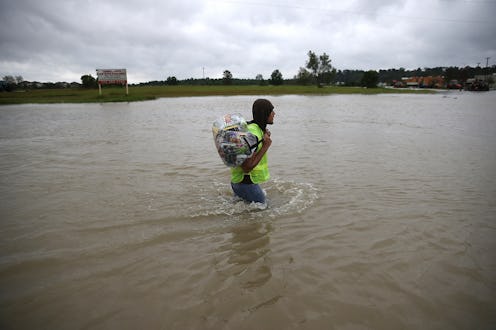
As Texans are enduring the tragic effects of Hurricane Harvey, there are many concerns about flooding across the state, including worry regarding whether Harvey's flood water is contaminated. Unfortunately, flood water is very prone to contamination — and officials are resultantly advising Texas' residents to take extensive precautions.
In an interview with Time magazine earlier this week, Dr. Richard Bradley, the chief of the division of emergency medical services and disaster medicine at McGovern Medical School at the University of Texas Health Science Center, noted that "The bacterial count in floodwater is extremely high." The doctors indicated that this puts people at risk for serious bacterial infections, including skin infections and intestinal infections, among others.
Moreover, Time reported that the Environmental Protection Agency (EPA) noted on its webpage about flooding that bacteria from raw sewerage as well as chemicals from the environment or industrial areas can enter into flood waters, rendering them contaminated. As Time noted, this contamination can result in a myriad of health issues, including stomach problems, flu-like symptoms, and others.
The Washington Post also reported yesterday that in Houston there is specific concern about contamination via Superfund sites, which are pieces of land that have been contaminated by toxic water and that have been identified as federal priorities for cleanup by the EPA. Harris County, which includes Houston, has at least a dozen Superfund sites. As the Post noted, there is concern that flood waters will pick up toxic waste from Superfund sites, potentially contaminating any areas where the flood water crosses and/or leaves deposits.
Another major concern with flood water consists of potential contamination of drinking water if flood water comes into contact with clean drinking water in water supply facilities. It is commonplace for officials to advise residents not to drink tap water immediately after a hurricane. However, in Houston this appears to be an even more urgent issue, as health officials have warned that water reservoirs are overflowing and that levees have been ruptured, meaning drinking water has come into contact with contaminated flood water.
According to CBS, there are several ways in which those in Texas can limit their contact with contaminated flood water. First and foremost, they should follow local officials' guidelines for consumption of drinking water, which will probably include using bottled water until tap water is deemed safe.
Moreover, Dr. Robert Glatter, an emergency physician at Lenox Hill Hospital in New York City, told CBS that residents should throw out any food that may have come into contact with flood water, as it could potentially be contaminated. This includes food that has been wrapped in plastic, cardboard, or paper, though canned food is still okay to consume.
Finally, Glatter advised Texans to limit their bodily exposure to flood water by wearing gloves, boots, and waterproof clothing when coming into contact with flood water, if possible. Glatter warned that bodily exposure to flood water makes people prone to skin infections, wound infections, and pink eye, among other issues.
It is incredibly unfortunate that, in addition to the physical safety and property damage risks posed by floods, Texas' residents now also have to be concerned about flood water contamination and its potential impacts on their health. Hopefully the flood waters will subside quickly so that Texans can at least not have to worry about wading through them and risking their health as they try to recover in the wake of Hurricane Harvey.